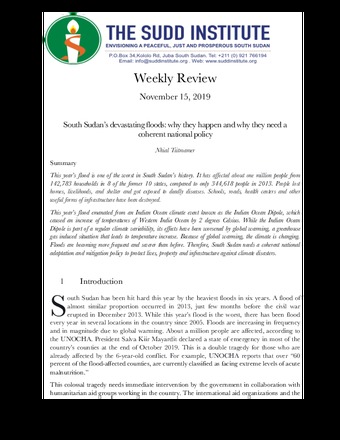South Sudan's devastating floods: why they happen and why they need a coherent national policy
Publication Summary
This year’s flood is one of the worst in South Sudan’s history. It has affected about one million people from 142,783 households in 8 of the former 10 states, compared to only 344,618 people in 2013. People lost homes, livelihoods, and shelter and got exposed to deadly diseases. Schools, roads, health centers and other useful forms of infrastructure have been destroyed.
This year’s flood emanated from an Indian Ocean climate event known as the Indian Ocean Dipole, which caused an increase of temperatures of Western India Ocean by 2 degrees Celsius. While the Indian Ocean Dipole is part of a regular climate variability, its effects have been worsened by global warming, a greenhouse gas induced situation that leads to temperature increase. Because of global warming, the climate is changing. Floods are becoming more frequent and severer than before. Therefore, South Sudan needs a coherent national adaptation and mitigation policy to protect lives, property and infrastructure against climate disasters.
Nhial Tiitmamer has served as the Director of the Environment and Natural Resources Program at The Sudd Institute where he is currently on leave to work with United Nations in South Sudan (UNMISS). He has served as an Adjunct Assistant Professor at the University of Juba where he has taught Environmental Economics, Natural Resources Economics and Environmental Sociology. Between November 2021 and November 2022, Nhial worked as Senior Environment Associate with the United Nations High Commissioner for Refugees (UNHCR) in Juba. Before returning from Canada in 2013, Nhial worked at Arletta Environmental Consulting in Calgary and at University of Alberta’s Augustana Campus in Camrose in Alberta, Canada. Nhial’s research focusses on natural resources governance, environmental protection, climate change, and sustainable energy. He was awarded in May 2023 by the Board of Directors of The Sudd Institute with Research Impact Award for policy impacts. Nhial holds a B.A. in Environmental Studies with a minor in English Literature from the University of Alberta and an M.Sc. in Sustainable Energy Development from the University of Calgary in Alberta, Canada.

